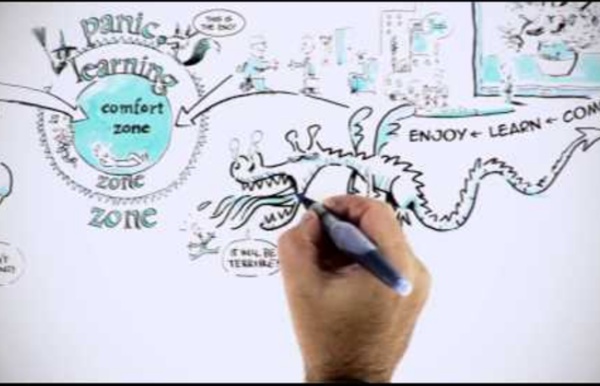



http://www.youtube.com/watch?v=HhFxQlDPjaY
Related: Self Development • ukundrotaite10 Things Unstoppable People Do That Average People Don't Do you get derailed by prior success? Do you do these 10 things? 1. Don't get crushed by success. Success can become a catalyst for failure. -- Greg McKeown Can You Really Improve Your Emotional Intelligence? - Tomas Chamorro-Premuzic Who wouldn’t want a higher level of emotional intelligence? Studies have shown that a high emotional quotient (or EQ) boosts career success, entrepreneurial potential, leadership talent, health, relationship satisfaction, humor, and happiness. It is also the best antidote to work stress and it matters in every job — because all jobs involve dealing with people, and people with higher EQ are more rewarding to deal with. 22 Tips To Better Care for Introverts and Extroverts 2.1K Flares Filament.io 2.1K Flares × Here is something that hit me recently: For a long time I had a certain idea about what makes an introvert or an extrovert. I had always thought that it works something like this: Extroversion relates to how outgoing someone isIntroversion is the same as being shy.
The Question Every Entrepreneur Has To Answer If you're an entrepreneur or thinking about becoming one, you should pay attention to the questions that VCs ask, especially when it's perhaps the biggest name on Sand Hill Road: Sequoia Capital. Writing at PandoDaily, Jason Calacanis talks about the question he hears most frequently from Sequoia investors when they're offering coaching and feedback to startups pitching for funding: "Why now?" Calacanis says that when they get asked the question, you can see their wheels turn. "They start reflecting on perhaps one of the most important questions in the age of the insta-startup," he writes, "What has changed that makes this the perfect time for this startup to exist?" Looking into recent startup successes, Calacanis counts the ways: YouTube: Bandwidth costs dive, video cameras go digital, and these things called smartphones--and their Internet-ready cameras--start appearing everywhere.
When Your Bread and Butter Skills Stop Working by Richmond Fourmy, Psy.D. The C-suite is a coveted career destination for ambitious leaders. But once they get there, many discover that leading at the top of the organization isn’t what they thought it would be. As a result, finding themselves in unfamiliar territory, they may fail or, at the very least, struggle to succeed. A few years ago, I was speaking with one such executive who found himself way out of his comfort zone in a C-level role that took him away from tasks and responsibilities he had always enjoyed.
Richard Branson on Self-Awareness for Leadership Growth Editor's Note: Entrepreneur Richard Branson regularly shares his business experience and advice with readers. Ask him a question and your query might be the inspiration for a future column. Q: What are the key personal characteristics that go hand-in-hand with business success? -- Titto Mbuvi All sorts of people find success as entrepreneurs, in every profession and area of life.
Water Off A Duck’s Back Critics, eh? Where would the games industry be without them? Well, that might be a good topic for a rant, but what I want to waffle on about today is how we as developers deal with criticism. It’s a tough world out there. 5 Tips for Writing Memoir « Art of Storytelling: On Writing Window view, Haverhill, MA 1. Write chronologically. On revision you can choose to mix things up, but for the rough draft, write your memoir chronologically. It’s so much easier to write that way, to remember the details.
Reinventing Organizations As founder of We-Q, the collaborative intelligence App, I had the pleasure of meeting and interviewing Frederic Laloux, author of Reinventing Organizations. Fredric talks of the need to restore “our birthright” of deep human connection back into the contemporary workplace. A link to the entire interview is below, but what follows is a description of the key themes, their relevance to the contemporary workplace, and their link to the effectiveness of We-Q. Fred believes that in many organisations it is dangerous to show our true selves. We all too often hide behind an unspoken agreement to be ‘professional’ i.e. making decisions based on reason rather than feelings. This creates toxic cultures, products and services, because we develop them from a limited part of our true selves, and they subsequently satisfy only a narrow part of people’s true needs.
How to Use Eye Contact to Improve Your Business and Love Life In our first post in this two-part series on eye contact, we discussed the importance of eye contact and some of the reasons we don’t always feel comfortable looking someone in the eye. But just because eye contact is a great thing and a vital tool for improving the quality of all your face-to-face interactions with others, doesn’t mean that more eye contact is always better or that all eye contact is created equal. You have to do it right—at the right time and in the right way. How to do that is what we’ll be exploring today. We’ll start off with a primer on how to make good eye contact in general conversational situations, and then we’ll tackle eye contact tips for specific scenarios. Let’s get started.
How Are You Applying Your Vision 08 September In General by peterwinick Tags: article marketing, attraction marketing, b2b marketing, blog marketing, content marketing, how to market a book, market a book, marketing blog, product marketing, Strategy, Thought leader, thought leadership, Vision Every thought leader and author has a vision for success; in fact, every successful business has a vision. Often times, energy and effort is spent debating, crafting and fine tuning the vision to ensure it is perfect. It’s integrated into the marketing and communication programs of the organization as well as the training and development of the employees. And then…? Well, typically it’s back to business – writing, speaking, finance, operations, sales, marketing, vendor management, technology, product development, customer service, etc.